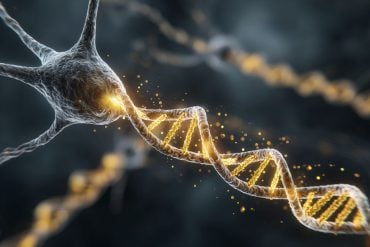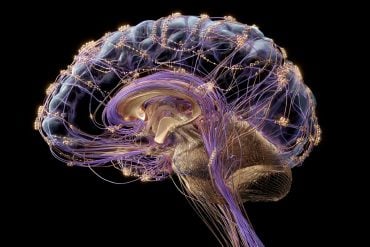Summary: At age ten, children whose mothers took fish oil supplements during pregnancy were more efficient at problem-solving tasks and had better attentional focus than those whose mothers just took folic acid or no supplements at all.
Source: ESPGHAN
Children born to mothers who took fish oil in their pregnancies have been shown to have faster problem-solving skills and better attention focus at age 10, according to findings from a study presented today at the 6th World Congress of Paediatric Gastroenterology, Hepatology and Nutrition.
This is the first study to examine the long-term effect of maternal supplementation with fish oil and/or 5-MTHF (folic acid) on the resting state network (RSN) functioning (this is ‘resting’ brain activity when a person is not engaged in a cognitive or active task) of children at school age and was funded by the European Union.
The children were assessed at age 10 using specialist rs-MRI brain scanning to measure RSN, alongside neuropsychological testing. The results of all groups were then compared for differences.
Professor Dr. Berthold Koletzko, Head of the Division of Metabolic and Nutritional Medicine at Dr. von Hauner Children’s Hospital, University of Munich Medical Centre, Munich, Germany, is one of the study’s authors.
Professor Koletzko says that children born to mothers taking the DHA-rich fish oil in pregnancy showed beneficial effects with faster processing speed when solving complex problems, and better results in attention tests.
‘The results demonstrate that the quality of maternal nutrient supply during the period of rapid early brain development in pregnancy, has a lasting impact on later brain function at school age.
Therefore, women before and during pregnancy should be supported in achieving a good quality diet and be counselled on potential fish oil supplement use.’
Coordinator of the study and Director of the EURISTIKOS Excellence Centre for Paediatric Research at the University of Granada, Spain, Professor Christina Campoy, adds:
‘Our research provides evidence that children born to mothers who had taken fish oil during the second half of pregnancy had improved memory. Fish oil supplementation was associated with lesser functional connectivity of children’s brain networks, but this did not indicate poor cognitive neurodevelopment, rather the opposite.’
Folic acid supplementation did not lead to appreciable modification of brain function measures.
The study by researchers at the University of Granada, Spain, followed up on 57 children of mothers from a previous research program who had been given 500mg of docosahexaenoic acid (DHA) and 150mg of eicosapentaenoic acid (EPA) fish oils per day, either with or without 400 μg of 5-MTHF (folic acid), folic acid alone, or placebo, during the second half of their pregnancies.

The authors stressed that although the sample size was small, a large number of validated techniques had been used to assess their hypothesis in the study and the data came from a well-established cohort (a group that is being followed up long term). They added that the results should be interpreted as preliminary data and cannot be considered to have general application, with further research being required.
Professor Magnus Domellöf, Chair of the ESPGHAN Nutrition Committee, commented on the research: ‘The results from this study indicate that early nutrition during pregnancy can have a significant impact on brain development in children, with the potential to enhance cognitive performance. We look forward to the outcomes of this study being tested in further trials.’
About this neurodevelopment research news
Source: ESPGHAN
Contact: Press Office – ESPGHAN
Image: The image is in the public domain
Original Research: The findings were presented at the Virtual 6th World Congress of Paediatric Gastroenterology, Hepatology and Nutrition.







